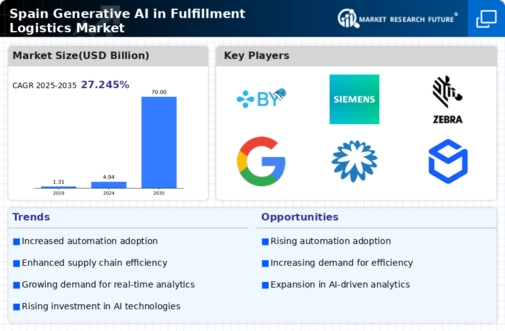Focus on Sustainability
The increasing emphasis on sustainability is reshaping the generative ai-in-fulfillment-logistics market. Spanish consumers are becoming more environmentally conscious, prompting companies to adopt greener logistics practices. In 2025, it is estimated that 70% of consumers in Spain prefer brands that demonstrate a commitment to sustainability. This shift is driving logistics providers to implement AI-driven solutions that optimize routes, reduce emissions, and minimize waste. By leveraging generative AI, companies can enhance their sustainability efforts while improving operational efficiency. Thus, the generative ai-in-fulfillment-logistics market is likely to thrive as businesses align their strategies with consumer preferences for sustainable practices.
Rising E-commerce Demand
The surge in e-commerce activities in Spain is a pivotal driver for the generative ai-in-fulfillment-logistics market. As online shopping continues to gain traction, logistics providers are compelled to enhance their fulfillment capabilities. In 2025, e-commerce sales in Spain are projected to reach approximately €50 billion, indicating a robust growth trajectory. This increasing demand necessitates the integration of generative AI technologies to optimize inventory management, streamline order processing, and improve delivery times. The generative ai-in-fulfillment-logistics market is thus positioned to benefit from this trend, as businesses seek innovative solutions to meet consumer expectations and maintain competitive advantages.
Labor Shortages in Logistics
Labor shortages in the logistics sector are emerging as a critical driver for the generative ai-in-fulfillment-logistics market. In Spain, the logistics industry faces challenges in attracting and retaining skilled workers, which can hinder operational efficiency. As of 2025, it is estimated that the logistics sector will experience a workforce gap of approximately 20%. This situation compels companies to explore automation and AI-driven solutions to mitigate the impact of labor shortages. Generative AI technologies can streamline processes, reduce reliance on manual labor, and enhance productivity. Consequently, the generative ai-in-fulfillment-logistics market is poised for growth as businesses seek to address these workforce challenges.
Technological Advancements in AI
Technological advancements in artificial intelligence are significantly influencing the generative ai-in-fulfillment-logistics market. Innovations in machine learning and data analytics are enabling logistics companies to harness vast amounts of data for improved decision-making. In Spain, investments in AI technologies are expected to exceed €1 billion by 2026, reflecting a growing recognition of AI's potential to enhance operational efficiency. These advancements facilitate predictive modeling, which can optimize supply chain processes and reduce costs. Consequently, This market is likely to experience accelerated growth as companies adopt these cutting-edge technologies to enhance their logistics operations.
Government Initiatives and Support
Government initiatives aimed at promoting technological innovation are playing a crucial role in the generative ai-in-fulfillment-logistics market. In Spain, the government has launched various programs to support the adoption of AI technologies across industries. By 2025, public funding for AI-related projects is projected to reach €500 million, fostering an environment conducive to innovation. These initiatives encourage logistics companies to invest in generative AI solutions that enhance efficiency and competitiveness. As a result, the generative ai-in-fulfillment-logistics market is likely to benefit from increased investment and support, driving further advancements in logistics operations.
















